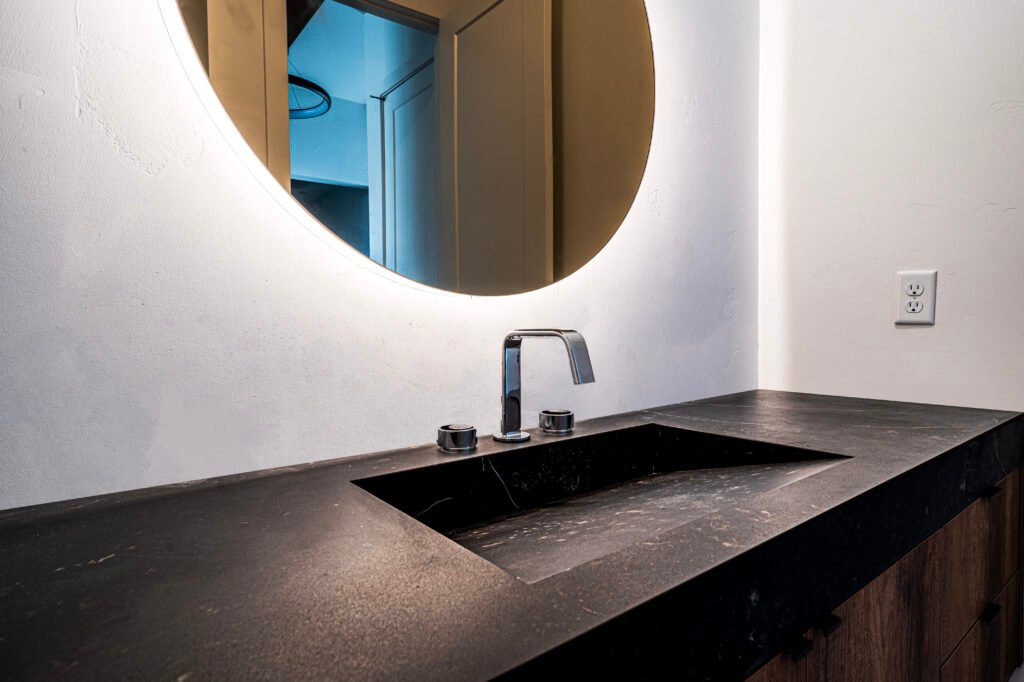
When it comes to bathroom design, the countertop is a vital element that can enhance both the appearance and functionality of the space. Different materials offer distinct benefits, but it’s crucial to choose the one that fits your bathroom’s specific needs. Let’s explore the pros and cons of quartz, granite, and marble for bathroom countertops to help you make the best decision.
Quartz: Durable and Non-Porous
Quartz is a top choice for bathrooms because of its durability and non-porous nature, making it resistant to stains, moisture, and bacteria. Its smooth, glossy surface is easy to maintain, and it comes in a wide variety of colors and patterns to fit different bathroom aesthetics.
Pros for Bathrooms:
- – Stain-resistant and non-porous, making it resistant to bacteria and mold.
- – Easy to clean and requires minimal maintenance.
- – Wide range of design options available.
Cons for Bathrooms:
- – Can be expensive.
- – Sensitive to heat, though this is less of a concern in bathrooms compared to kitchens.

Granite: A Natural Beauty
Granite is a luxurious, natural stone that’s known for its rich, unique patterns and colors. It adds a sense of elegance to any bathroom. Granite is durable and heat-resistant, but it is porous, meaning it requires regular sealing to prevent water absorption.
Pros for Bathrooms:
- – Durable and heat-resistant, ideal for areas with frequent use.
- – Adds significant resale value to your home.
- – Offers a wide range of natural, unique patterns and colors.
Cons for Bathrooms:
- – Requires regular sealing to prevent moisture damage.
- – Can be susceptible to stains if not properly maintained.
Marble: Timeless Elegance
Marble offers timeless beauty with its veining and unique patterns. It’s a popular choice for bathrooms with low to moderate traffic due to its high maintenance needs. Marble can make your bathroom feel luxurious, but it requires sealing and extra care to avoid staining from bathroom products.
Pros for Bathrooms:
- – Adds an upscale, classic look.
- – Every slab is unique, offering a custom feel.
- – Heat-resistant, making it great for bathrooms.
Cons for Bathrooms:
- – Susceptible to scratches and staining.
- – Requires frequent sealing to avoid moisture damage.
- – Prone to etching from acidic products often used in bathrooms.
Dekton: Ultra-Compact and Resilient
Dekton is a relatively new, ultra-compact surface material that’s gaining popularity for both kitchens and bathrooms. It’s highly durable, heat-resistant, scratch-resistant, and UV-stable, meaning it won’t fade. Dekton is non-porous, making it perfect for a bathroom environment as it resists moisture, bacteria, and stains.
Pros for Bathrooms:
- – Ultra-durable and resistant to heat, scratches, stains, and UV rays.
- – Perfect for high-moisture environments, as it’s completely non-porous.
- – Low maintenance with a modern aesthetic.
Cons for Bathrooms:
- – Can be more expensive than other materials.
- – May chip at the edges over time if not handled carefully.

Which Countertop Material is Best for Your Bathroom?
Each material offers unique benefits depending on your bathroom’s aesthetic and functional needs. Quartz and Dekton are both durable, non-porous options that offer easy maintenance and moisture resistance, making them ideal for high-traffic bathrooms. Granite offers a natural, luxurious touch but requires more care, while marble provides timeless elegance for bathrooms with lower usage. Ultimately, your choice will depend on the balance of style, durability, and upkeep that works best for you. Schedule a free design consultation and let us guide you through the process of selecting the best materials for your needs.
